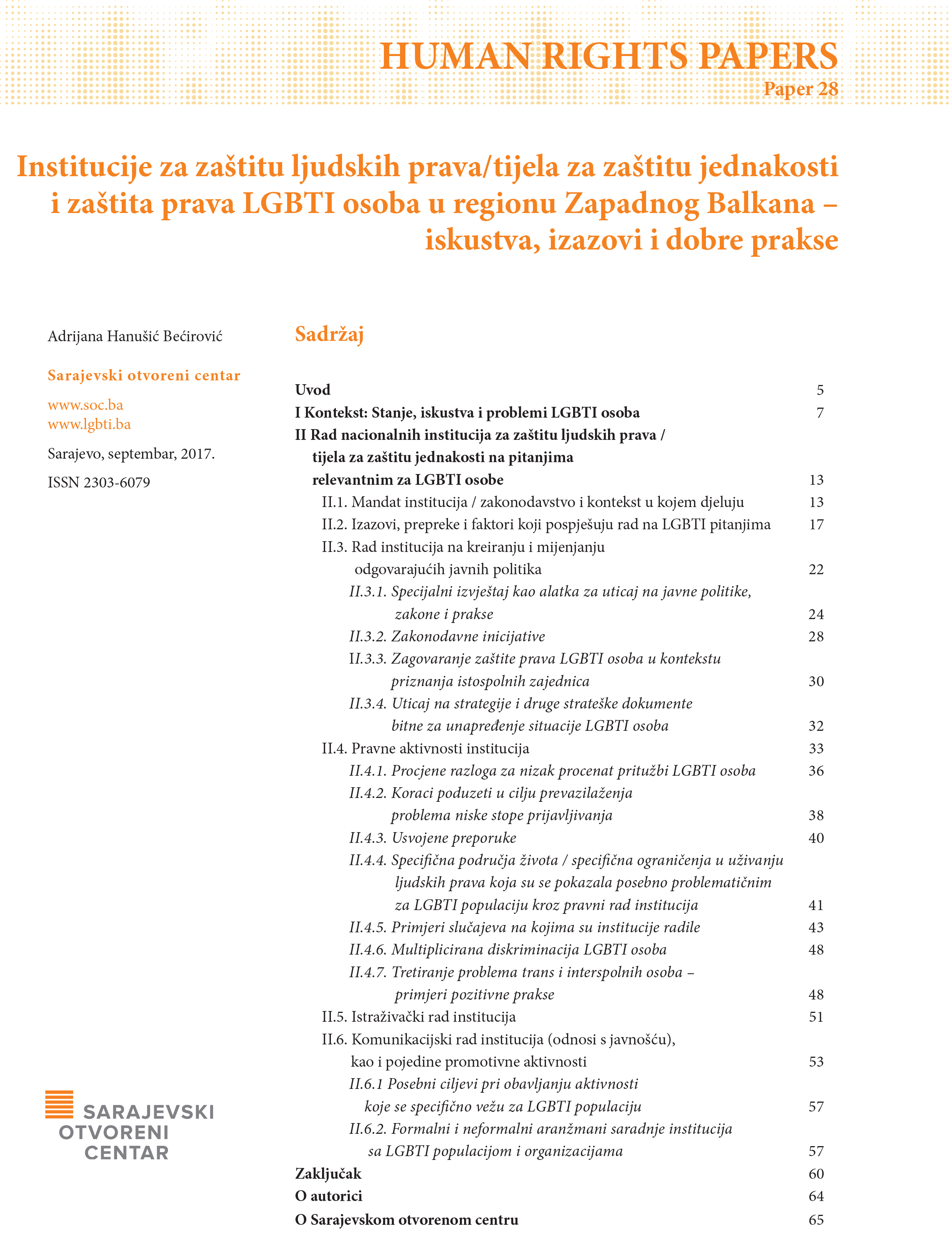How National Human Rights Institutions protect LGBTI rights in the Western Balkans
 Sarajevo Open Centre published a policy paper titled „National Human Rights Institutions and the Protection of LGBTI rights in the Western Balkans – Experiences, Challenges and Good Practices“. The results of the research on the experiences of bodies for the protection of human rights or equality in Albania, Bosnia and Herzegovina, Montenegro, Croatia, Kosovo, Macedonia and Serbia with the activities on the protection of LGBTI rights presented in this report, show several common features. The same or similar challenges in all societies have been identified, such as the unfavourable social and political environment, systemic problem of the lack of implementation of their recommendations, ensuring their independence, budgetary constraints, lack of sufficient staff training. All these systemic problems are reflected in the protection of the LGBTI community.
Sarajevo Open Centre published a policy paper titled „National Human Rights Institutions and the Protection of LGBTI rights in the Western Balkans – Experiences, Challenges and Good Practices“. The results of the research on the experiences of bodies for the protection of human rights or equality in Albania, Bosnia and Herzegovina, Montenegro, Croatia, Kosovo, Macedonia and Serbia with the activities on the protection of LGBTI rights presented in this report, show several common features. The same or similar challenges in all societies have been identified, such as the unfavourable social and political environment, systemic problem of the lack of implementation of their recommendations, ensuring their independence, budgetary constraints, lack of sufficient staff training. All these systemic problems are reflected in the protection of the LGBTI community.
Research results can be used to inform the public and to make an impact on the relevant public policy development, especially in environments in which the public support is not as visible, but also to shape their own work on LGBTI issues which is particularly relevant in the very start of dealing with this topic. It has been verified in a number of countries that a special report on LGBTI issues is a particularly powerful tool for a comprehensive approach to solving the problems of the LGBTI population. These reports can analyse various aspects of violations of LGBTI rights in a single document, raise awareness on the issue of the protection of their rights and, in their recommendations, identify the key steps to be taken to influence public policies, practices, and laws which should address the problems.
Many problems are identified and addressed through complaints of LGBTI rights violations, i.e. through concrete legal action. The report presents some of the key cases of LGBTI human rights violations which the bodies handled as examples of good practice for addressing various problems that LGBTI people may face. However, we have to be aware of the prevailing problem of the insufficient reporting of LGBTI rights violations – and this requires serious work. The tactic which has been efficient is the cooperation with civil society organizations as it enhances the trust in institutions and informs the public on the legal mechanisms of protection. In this way, the institutions can find out about the violations in order to initiate ex officio investigations and provide recommendations. The continuous monitoring of media reporting is an equally important tactic.
The cooperation with other stakeholders, primarily the media and civil society organizations, has been recognized as a crucial aspect of work in many segments of the report, as it often provides for an opportunity to respond to existing problems and restrictions which characterize the work of these institutions. Ideally, the cooperation should be formalized through special advisory bodies active within certain institutions. Different types of cooperation may constitute a consultations platform for important LGBTI issues, provision of expert assistance, and overcoming problems of the lack of reporting of LGBTI rights violations. In this war, the technical and financial support could be ensured needed for various activities, such as research or necessary staff training, as has been done in some cases with non-governmental and international organizations, as part of Twinning projects, through the EQUINET, and other relevant processes.
Especially in the context of budgetary restrictions which all of these bodies face, the support of organizations such as the UNDP, OSCE, the Council of Europe, the European Union and USAID is key in making sure that individual activities will be implemented. To lead to the best possible effect, these activities should be implemented in appropriate moments, to the extent stipulated by the mandate of the institution, in order to comprehensively respond to problems that LGBTI people face in our societies in different areas of life. The first step in that direction is an insight into the practice of bodies which operate in similar social, political, and economic contexts and learning from their mistakes and successes.